Top Supplements to Balance Mood Naturally
Introduction
We all experience mood fluctuations — the ups and downs of life, stress, and changing hormones. But for some, these emotional waves can feel more like storms. If you’ve ever wondered why your energy, motivation, or patience seem to vanish without warning, it might not be “just stress.” Your brain and body could be missing key nutrients that help regulate mood and calm the nervous system.
The good news? Nature has provided us with powerful tools to bring emotional balance back — safely and effectively. From vitamins that regulate serotonin to adaptogens that buffer stress hormones, the right supplements can restore calm, focus, and resilience without the harsh side effects of medications.
Let’s explore the best science-backed supplements that support mood regulation naturally — and how to use them for long-term emotional well-being. 🌞
🧠 Omega-3 Fatty Acids: The Brain’s Mood Stabilizer

If there’s one nutrient consistently linked to better emotional health, it’s omega-3 fatty acids — particularly EPA (eicosapentaenoic acid) and DHA (docosahexaenoic acid).
Your brain is composed largely of fat, and omega-3s help build and maintain the structure of brain cell membranes. They also regulate neurotransmitters like serotonin and dopamine, which directly affect happiness and motivation.
🌊 How They Work
Reduce inflammation in the brain (which contributes to depression and anxiety).
Improve cell communication, allowing mood-related neurotransmitters to flow freely.
Support neuroplasticity, helping your brain adapt to stress and recover from emotional strain.
📈 Research Spotlight
A 2019 meta-analysis found that omega-3 supplementation — especially EPA-rich formulas — significantly reduced symptoms of depression in adults.
💊 Recommended Form
Fish oil or algae oil (vegan source).
Look for a 2:1 ratio of EPA:DHA for mood support.
Dosage: 1,000–2,000 mg per day of combined EPA and DHA.
🥗 Food Sources
Salmon, sardines, mackerel, walnuts, flaxseeds, chia seeds, and algae-based supplements.
🌼 Magnesium: The Calming Mineral
Often called the “relaxation mineral,” magnesium is crucial for over 300 enzymatic reactions in the body — including those that influence mood and stress.
Low magnesium levels are associated with irritability, anxiety, insomnia, and even depression. Chronic stress depletes magnesium, creating a vicious cycle where you feel more anxious the lower your magnesium becomes.
⚙️ How It Works
Regulates GABA, your brain’s calming neurotransmitter.
Helps balance cortisol, the stress hormone.
Promotes deep, restorative sleep, which directly influences emotional stability.
💊 Best Forms for Mood
Magnesium glycinate: gentle on the stomach and great for relaxation.
Magnesium threonate: crosses the blood-brain barrier, supporting cognitive and emotional health.
📈 Research Insight
A 2017 study in PLoS ONE showed that adults who took 248 mg of magnesium daily experienced significant improvements in mood and anxiety within two weeks.
💡 Tip
Take magnesium in the evening with a light snack to enhance calm and sleep quality.
☀️ Vitamin D: The Sunshine Vitamin for Emotional Balance
If you ever feel your mood dip during cloudy months, you’re not imagining it — low vitamin D levels can lead to low serotonin production.
Vitamin D functions more like a hormone than a vitamin. It influences genes responsible for neurotransmitter production and helps regulate inflammation, both of which impact mental health.
🌤️ How It Helps
Boosts serotonin and dopamine production.
Reduces inflammatory cytokines linked to depression.
Regulates sleep-wake cycles and energy.
📊 Research Findings
Studies consistently show a correlation between low vitamin D levels and higher rates of depression, anxiety, and fatigue. Supplementing with vitamin D has been shown to improve mood, especially in those who are deficient.
💊 Dosage
1,000–2,000 IU daily for maintenance.
3,000–5,000 IU if deficient (check with your healthcare provider).
Take it with healthy fats for better absorption.
☀️ Natural Sources
Sunlight, fatty fish, egg yolks, and fortified plant-based milks.
🌿 Ashwagandha: The Adaptogen for Stress Relief
When life feels overwhelming, ashwagandha can help bring your nervous system back into balance.
An ancient Ayurvedic herb, ashwagandha is known as an adaptogen — meaning it helps your body adapt to stress by regulating cortisol levels and supporting adrenal health.
🧘 How It Works
Reduces cortisol and supports a calmer stress response.
Enhances serotonin receptor sensitivity, improving mood.
Helps with sleep and focus when anxiety disrupts rest.
📈 Clinical Support
A 2021 review in Cureus Journal found that ashwagandha supplementation significantly reduced perceived stress and improved mental well-being in multiple human trials.
💊 Best Form
KSM-66® or Sensoril® Ashwagandha extracts (standardized for withanolides).
Dose: 300–600 mg per day.
Ashwagandha works best taken consistently for 4–8 weeks.
💐 B-Complex Vitamins: The Energy and Mood Builders
The B-vitamin family is essential for energy production, neurotransmitter synthesis, and stress resilience. Deficiencies in B6, B9 (folate), and B12 are especially linked to depression, irritability, and mental fatigue.
⚡ How They Support Mood
B6 (Pyridoxine): Converts tryptophan into serotonin and dopamine.
B9 (Folate) & B12: Support methylation — crucial for neurotransmitter balance.
B1 & B5: Support adrenal function and energy during chronic stress.
📈 Research Snapshot
People with low B-vitamin status often respond poorly to antidepressants. Supplementing with a high-quality B-complex improves both mood and cognitive performance.
💊 Recommended Form
A balanced B-complex with methylated forms (e.g., methylfolate, methylcobalamin).
Take with breakfast to support energy throughout the day.
🍃 L-Theanine: Calm Focus Without Sedation
Found naturally in green tea, L-theanine promotes relaxation without drowsiness — making it perfect for those who feel anxious or mentally overstimulated.
💨 Mechanism of Action
Increases alpha brain waves, associated with calm focus.
Enhances GABA, serotonin, and dopamine levels.
Reduces physical tension while improving alertness.
📈 Research Findings
Studies show that taking 200 mg of L-theanine can reduce stress during mentally demanding tasks and even improve sleep quality when paired with caffeine-free green tea extract.
☕ Best Use
Take L-theanine in the morning or during stressful situations. Many combine it with low-dose caffeine (50–100 mg) for smooth focus without jitters.
🌸 Probiotics: The Gut-Brain Connection
It might surprise you, but your gut health plays a major role in how you feel emotionally. The gut produces 90% of your body’s serotonin, and gut bacteria influence its balance.
When your microbiome is out of sync (due to stress, antibiotics, or poor diet), your mood often suffers too.
🌱 How Probiotics Support Mood
Increase production of GABA and serotonin.
Lower inflammatory cytokines that trigger anxiety and depression.
Improve gut permeability, preventing “leaky gut” and its mood-disrupting effects.
🧫 Research Insight
A 2020 review in Nutrients found that “psychobiotics” — probiotics that influence the brain — can improve mood and reduce anxiety in both healthy and clinical populations.
💊 Recommended Strains
Lactobacillus rhamnosus
Bifidobacterium longum
Lactobacillus helveticus
💡 Pro Tip
Pair probiotics with prebiotics (fiber-rich foods like oats, garlic, and bananas) to help good bacteria thrive.
🌺 Saffron Extract: The Golden Spice of Happiness
Saffron isn’t just a luxury spice — it’s also one of nature’s most potent natural antidepressants.
🌼 How It Works
Boosts serotonin and dopamine levels in the brain.
Improves emotional stability and reduces PMS-related mood swings.
Acts as a gentle anti-inflammatory agent in the nervous system.
📈 Scientific Findings
Several randomized controlled trials show saffron is as effective as certain antidepressants (SSRIs) for mild-to-moderate depression — without the common side effects.
💊 Supplementation
30 mg/day (standardized to 2% safranal).
Works well when combined with magnesium or B-vitamins.
🌿 Note
Look for clinically studied extracts like Affron® or Satiereal® for consistency and purity.
🪶 Rhodiola Rosea: Adaptogen for Mental Energy and Resilience
If stress has left you feeling depleted rather than anxious, Rhodiola rosea may be your answer.
This adaptogenic herb boosts energy, reduces fatigue, and improves mental clarity — making it ideal for those who feel “burnt out.”
⚙️ Mechanism
Balances cortisol and adrenaline levels.
Increases serotonin and norepinephrine activity.
Enhances physical and mental endurance.
📈 Research Spotlight
Clinical trials have shown that Rhodiola can reduce fatigue, depression, and anxiety within two weeks of consistent use.
💊 Dosage
200–400 mg/day, standardized to 3% rosavins and 1% salidroside.
Take in the morning or midday (it can be stimulating).
🌱 5-HTP: The Serotonin Precursor
5-HTP (5-hydroxytryptophan) is a natural compound your body produces from tryptophan, later converted into serotonin — the key neurotransmitter for emotional balance.
⚙️ How It Helps
Increases serotonin levels naturally.
Improves sleep by enhancing melatonin synthesis.
Reduces mood swings, anxiety, and carbohydrate cravings.
⚠️ Caution
Because 5-HTP directly affects serotonin, it should not be combined with antidepressant medications unless supervised by a healthcare professional.
💊 Dosage
50–200 mg/day, preferably taken in the evening.
Works well combined with magnesium or vitamin B6.
🌿 GABA: The Natural Relaxation Neurotransmitter
GABA (Gamma-Aminobutyric Acid) is your body’s primary calming neurotransmitter — think of it as your brain’s “brake pedal.”
When GABA levels are low, your mind races, muscles tense, and anxiety skyrockets. Supplementing GABA can help restore calm.
💨 How It Works
Reduces neuronal excitability, easing anxious thoughts.
Promotes physical relaxation and deeper sleep.
Enhances alpha brain waves (the same state achieved during meditation).
💊 Dosage
100–500 mg per day, taken before bed or during high-stress moments.
Works synergistically with L-theanine and magnesium.
🌻 SAMe (S-Adenosylmethionine): The Natural Mood Enhancer
SAMe is a compound naturally produced in the body that helps regulate neurotransmitter synthesis — especially dopamine, serotonin, and norepinephrine.
Low SAMe levels are linked to depression and cognitive decline.
⚙️ How It Works
Supports methylation, a process vital for mood regulation.
Enhances energy, motivation, and focus.
Reduces depressive symptoms without sedation.
📈 Research Findings
A 2010 meta-analysis found SAMe to be as effective as standard antidepressants for mild-to-moderate depression, with faster onset of effects.
🌼 Vitamin B12 and Folate: The Neurotransmitter Duo

Both B12 and folate are essential for methylation, a biochemical process that regulates mood-related neurotransmitters.
Deficiency in either can lead to fatigue, irritability, brain fog, and even depressive symptoms.
💊 Dosage
B12 (methylcobalamin): 1,000 mcg/day.
Folate (methylfolate): 400–800 mcg/day.
Together, they form the backbone of emotional stability — especially for vegetarians and vegans who may be deficient.
🌸 Curcumin: The Anti-Inflammatory Mood Booster
Curcumin, the active compound in turmeric, is a natural anti-inflammatory and antioxidant that supports brain health.
Chronic inflammation is increasingly linked to depression and anxiety. Curcumin helps by lowering inflammatory cytokines and improving serotonin and dopamine levels.
💊 Dosage
500–1,000 mg/day (with black pepper extract for absorption).
Works synergistically with omega-3s and vitamin D.
💊 Dosage
400–1,200 mg/day, taken on an empty stomach.
Often combined with B12 and folate for best absorption.
🧘 Adaptogenic Blends for Whole-Body Balance
If you prefer an all-in-one approach, consider adaptogenic blends that combine several herbs known for balancing mood and stress, such as:
Rhodiola rosea
Ashwagandha
Holy basil (Tulsi)
Schisandra berry
These work in harmony to:
Regulate cortisol and energy levels.
Support adrenal resilience.
Promote calm alertness.
Adaptogen formulas are great for those under chronic stress, fatigue, or mood instability.
🌤️ Bonus: Lifestyle Synergy for Natural Mood Balance
Even the best supplements work best when paired with lifestyle habits that support your nervous system and brain chemistry.
🧘 Breathwork
Breathing deeply activates the vagus nerve, calming your nervous system and increasing GABA naturally.
🏃 Movement
Exercise releases endorphins, enhances dopamine sensitivity, and reduces inflammation.
😴 Sleep
Your brain resets neurotransmitter levels during deep sleep. Prioritize 7–9 hours nightly.
🌞 Sunlight and Nature
Just 20 minutes of morning sunlight can improve serotonin levels and regulate circadian rhythm.
🍎 Anti-Inflammatory Diet
Prioritize whole foods, fiber, healthy fats, and antioxidants. Limit processed sugar and trans fats, which disrupt mood-regulating hormones.
🧩 How to Combine Mood-Boosting Supplements
Here’s a sample mood support stack you can safely try (always consult a healthcare provider first):
Morning 🌞
Omega-3 (1,000 mg EPA/DHA)
Vitamin D (2,000 IU)
B-Complex
Rhodiola (200 mg)
Afternoon 🌿
Magnesium glycinate (200 mg)
L-theanine (200 mg)
Probiotic blend
Evening 🌙
Ashwagandha (300 mg)
5-HTP (100 mg) or GABA (200 mg)
Herbal tea or Epsom salt bath
This combination targets serotonin, GABA, cortisol, and inflammation — creating a balanced mood foundation.
🌱 Final Thoughts: Supporting Mood the Natural Way
Balancing mood naturally is about nourishing both body and mind. The right supplements don’t just mask symptoms — they rebuild the biochemical foundation of emotional resilience.
When combined with sunlight, mindfulness, and self-compassion, these nutrients can help you rediscover a sense of calm, motivation, and joy in everyday life.
Remember: emotional balance is not about feeling “perfectly happy” — it’s about building stability so that life’s ups and downs don’t throw you off course. 🌤️
Related Posts
-

Nootropics That Promote Calm and Rest
Explore the world of calming nootropics — natural brain enhancers that promote relaxation, better focus, and deeper rest. Learn how L-Theanine, magnesium, ashwagandha, and other adaptogens help balance your nervous system, reduce stress, and support restorative sleep.
-

Best Natural Supplement Stack for Sleep
Discover the best natural supplement stack for deep, restorative sleep. Learn how nutrients like magnesium, L-theanine, glycine, and calming herbs such as chamomile and ashwagandha work together to relax your body, calm your mind, and improve sleep quality—naturally and safely.
-

Combining L-Theanine and Magnesium for Sleep: A Calm Night, Naturally
Discover how combining L-Theanine and Magnesium can help you drift into deep, restorative sleep. Learn how this natural duo calms the mind, relaxes the body, and supports your nervous system—without grogginess the next morning.
-

How to Sleep Better After Intense Workouts
Struggling to fall asleep after a tough workout? Learn how to optimize your post-training recovery with nutrition, hydration, and science-backed sleep strategies. Discover how to calm your nervous system, balance hormones, and wake up fully recharged for your next session.
-

Ashwagandha and Valerian: A Bedtime Combo for Deep Rest and Emotional Reset
Discover the calming synergy of Ashwagandha and Valerian root, two natural sleep aids that help quiet the mind, ease anxiety, and promote deeper rest. Learn how this herbal duo supports the nervous system, balances stress hormones, and restores emotional peace — without next-day grogginess.
-

How to Create a Resilience-Boosting Diet
Discover how to build emotional and physical strength from the inside out with a resilience-boosting diet 🍎. Learn which foods stabilize your mood, how supplements like magnesium and omega-3s strengthen your stress response, and why pairing nutrition with breathwork and therapy creates lasting calm, focus, and vitality 🌿💪.
-

Best Teas and Herbal Blends for Calmness: Nature’s Way to Restore Inner Peace
Ashwagandha, the ancient adaptogenic herb, helps your body find balance during stress. Known as “Indian ginseng,” it supports cortisol regulation, boosts energy, and restores calm clarity. Discover how this powerful root promotes resilience, emotional balance, and steady vitality — one cup at a time. 🌸
-

Parenting and Emotional Strength: How to Raise Children Without Losing Yourself
Empathy is the bridge that connects hearts — the quiet power to understand, feel, and support another’s emotions without judgment. Learn how empathy strengthens relationships, enhances communication, and cultivates deeper compassion in everyday life. 🌿
-

How to Bounce Back from Public Failure: Reclaiming Confidence, Purpose, and Power
Visualization is more than imagination — it’s brain training for resilience. By picturing calm, success, or healing, you activate the same neural pathways as real experience. Learn how daily visualization rewires your brain for confidence, emotional balance, and recovery from stress. ✨
-

Coping with Financial Stress Through Resilience: How to Stay Grounded When Money Feels Tight
Body awareness is the foundation of emotional resilience. By tuning into your body’s signals — tension, fatigue, or calm — you learn to recognize stress before it overwhelms you. Discover how mindfulness, gentle movement, and breathwork can deepen your connection with your body and restore balance from the inside out. 🧘
-

How to Stay Positive During Chronic Illness: A Guide to Emotional Strength and Hope
Creativity is more than art — it’s a form of healing. Whether through painting, writing, music, or small acts of expression, creativity helps release emotion, calm the nervous system, and reconnect you to joy. Discover how to use creativity as a tool for emotional balance, resilience, and self-discovery. 🌿
-

Resilience Tips for Caregivers: How to Stay Strong While Caring for Others
Joy isn’t the absence of pain — it’s the quiet strength to find light even in challenging times. Cultivating joy through small daily moments restores balance, releases stress, and reminds you of life’s beauty. Learn how to reconnect with authentic happiness, rebuild emotional energy, and nurture your nervous system through gratitude, presence, and play. 🌿
-

Building Resilience After a Breakup: How to Heal, Rebuild, and Rise Stronger
Social connection is one of the strongest predictors of emotional resilience. During difficult times, genuine relationships act as anchors — calming the nervous system, reducing stress hormones, and helping you regain perspective. Learn how cultivating real human connection can strengthen your mind, heart, and overall well-being. 🌿
-

How to Stay Emotionally Strong During Job Loss
Your emotions are powered by brain chemistry — a delicate balance of neurotransmitters like serotonin, dopamine, and cortisol. When these chemicals work in harmony, you feel calm, focused, and resilient. Learn how daily habits, nutrition, and mindfulness can support your brain chemistry and boost emotional well-being naturally. 🌿
-

The Role of Hormones in Emotional Stability: How Your Chemistry Shapes Your Calm
Hormones shape more than your body — they shape your emotions, resilience, and sense of calm. From cortisol to serotonin, these chemical messengers influence how you react to stress, connect with others, and recover from challenges. Learn how to balance your hormones naturally to build lasting emotional stability and harmony within. 💫
-

Mitochondria and Emotional Energy: The Cellular Power Behind Your Mood
Breathwork is one of the most powerful tools for emotional regulation and cellular balance. Through intentional breathing, you can calm your nervous system, increase oxygen flow to the brain, and even support mitochondrial energy. Learn how conscious breathing connects body and mind — transforming stress into presence and emotional strength. 🌿
-

Inflammation and Its Impact on Mood Resilience: The Silent Link Between Body and Mind
Inflammation doesn’t just affect the body — it impacts the mind. Chronic inflammation alters brain chemistry, depletes serotonin, and makes emotional recovery harder. Learn how calming inflammation through nutrition, mindfulness, and sleep can restore balance, resilience, and a renewed sense of emotional strength. 💫
-

How Antioxidants Protect Emotional Well-being: The Hidden Link Between Oxidative Stress and Mental Health
Antioxidants do more than protect your body — they defend your mind. By neutralizing oxidative stress, antioxidants support serotonin, dopamine, and brain energy pathways that keep you calm, focused, and emotionally balanced. Discover how foods like berries, green tea, and dark chocolate nourish your brain, boost mood, and strengthen resilience from the inside out. 🌿✨
-

The HPA Axis and Emotional Health: The Hidden Bridge Between Stress and Mind
Neuroplasticity — the brain’s ability to rewire and adapt — is the foundation of emotional healing and resilience. When you face stress, trauma, or change, your neural pathways can reshape themselves to support new patterns of calm, focus, and self-awareness. Learn how daily practices like mindfulness, therapy, and breathwork strengthen neuroplasticity to transform emotional pain into personal growth. 🌸
-

Why Cortisol Control Is Key to Resilience: Mastering Stress to Build Emotional Strength
Controlling cortisol — the body’s main stress hormone — is the secret to lasting resilience. When cortisol levels stay balanced, your mind becomes clearer, emotions steadier, and energy more sustainable. Learn how breathwork, mindset shifts, adaptogens, and daily rhythms can help you calm your stress response and build true inner strength. 🌞💪
-

Dopamine’s Influence on Motivation and Recovery: Reigniting Drive and Balance
Healthy relationships are the foundation of emotional balance and resilience. Whether romantic, familial, or platonic, genuine connection releases dopamine, serotonin, and oxytocin — the brain’s “bonding trio” — helping us feel secure, motivated, and seen. Learn how trust, empathy, and communication not only strengthen your connections but also reshape your nervous system for deeper emotional well-being. 🌿🤝
-

The Role of Serotonin in Resilience: How This “Mood Molecule” Shapes Emotional Strength
Serotonin — often called the “resilience molecule” — plays a vital role in how we handle stress, regulate mood, and recover from emotional challenges. Beyond happiness, this powerful neurotransmitter helps balance the gut-brain axis, stabilize the nervous system, and support emotional flexibility. Learn how nutrition, sunlight, mindfulness, and adaptogens can naturally boost serotonin and strengthen your emotional resilience. 🌞🧠
-

How Neuroplasticity Supports Emotional Growth: Rewiring the Brain for Resilience
Neuroplasticity is the brain’s built-in power to grow, adapt, and heal — and it’s the foundation of emotional transformation. Every mindful breath, compassionate act, or reframed thought strengthens new neural pathways that support resilience and self-awareness. Learn how your brain rewires through daily habits, helping you turn emotional challenges into opportunities for growth and calm. 🌿
-

Tai Chi and Adaptogens for Mind-Body Balance: The Art of Harmonizing Energy and Resilience
Alchemy isn’t just an ancient science — it’s a timeless symbol of transformation and inner balance. By blending the physical and spiritual, alchemy teaches us that change begins from within. Just as metals are refined into gold, we too can transmute emotional pain, stress, and chaos into clarity and strength through mindful practice and self-awareness. 🌙✨
-

Cold Therapy and Emotional Control: Training the Mind Through the Body
Cold therapy isn’t just for athletes — it’s a tool for emotional mastery. By exposing your body to controlled cold, you train your nervous system to stay calm under stress, improving focus, mood, and resilience. This article explores the science of cold exposure, its impact on hormones and the vagus nerve, and how ice baths and cold showers can help you build emotional control, one breath at a time. 🧊🧘♂️
-

How Music Influences Emotional Recovery: The Healing Soundtrack of the Mind
Neuroplasticity — the brain’s ability to rewire and heal itself — is at the heart of emotional recovery. Through mindful habits, music, therapy, and consistent mental stimulation, your brain can form new connections that support resilience and well-being. Discover how neuroplasticity turns pain into growth, helping you rebuild balance, focus, and emotional strength. 🌿
-

Nature Therapy for Building Resilience: Reconnecting With the Healing Power of the Earth
Nature therapy helps rebuild emotional resilience by reconnecting you with the healing rhythms of the Earth. From forest walks to sunlight exposure, nature restores balance to your nervous system, lowers stress hormones, and teaches emotional adaptability. Learn how spending time outdoors can enhance mental clarity, calm anxiety, and awaken your natural capacity to heal. 🌞
-

Breathwork Techniques That Pair with Supplements: The Ultimate Synergy for Stress Relief and Mental Clarity
Breathwork and supplements create a powerful mind-body synergy for stress relief, focus, and energy. By combining intentional breathing with adaptogens, nootropics, and calming nutrients, you can naturally regulate cortisol, sharpen mental clarity, and boost emotional balance. This guide explores the best breathwork techniques and supplement pairings to help you feel centered, calm, and energized from the inside out. 🌿
-

Why Cortisol Balance Matters for Emotional Strength
Balancing cortisol — your body’s main stress hormone — is essential for emotional resilience. When cortisol is chronically high, your mind stays stuck in survival mode, leading to fatigue, anxiety, and emotional instability. This article explores how nutrition, supplements, breathwork, and therapy can help restore healthy cortisol rhythms, regulate the nervous system, and strengthen your ability to handle life’s challenges with calm focus and emotional strength. 🌿
-

Best Supplements for Students During Exam Season: Focus, Energy, and Memory Support
Studying late into the night? Learn which natural supplements can boost focus, memory, and mental stamina during exam season — without the crash. From omega-3s to Bacopa and Rhodiola, discover your brain’s ultimate exam support stack. 🎓🧠
-

Natural Memory Boosters for Seniors: How to Keep Your Mind Sharp and Focused
Stay mentally sharp and confident as you age. Discover science-backed natural supplements and lifestyle habits that boost memory, focus, and brain longevity for seniors. 🌿🧠
-

The Link Between Stress, Cortisol, and Memory Loss
Chronic stress can quietly erode your memory — and cortisol is the key culprit. Learn how stress hormones affect the brain, why the hippocampus shrinks under pressure, and how natural strategies can help you restore memory and mental clarity. 🧠✨
-

How to Build a Daily Supplement Routine for Memory Health
Want to sharpen your memory and stay mentally clear? Learn how to build a daily supplement routine for memory health — from morning focus to nighttime brain repair. Discover science-backed nutrients that boost recall, focus, and long-term cognitive resilience. 🧠🌿
-

Top 5 Natural Supplements for Memory Recall and Focus
Looking to boost memory and concentration naturally? Discover the top 5 supplements — Bacopa, Ginkgo Biloba, Lion’s Mane, Rhodiola, and Phosphatidylserine — that enhance focus, recall, and long-term brain health. 🧠✨
-
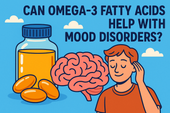
Can Omega-3 Fatty Acids Help with Mood Disorders?
Omega-3 fatty acids do more than support heart health — they can help balance mood, reduce depression, and calm anxiety. Discover how EPA and DHA nourish your brain, fight inflammation, and support emotional well-being from within. 🌊🧠
-

Vitamin D and Mood: The Sunshine Vitamin for Emotional Balance
Could the key to emotional balance be as simple as a little sunlight? Discover how vitamin D — the sunshine vitamin — influences serotonin, reduces inflammation, and helps you feel more positive and resilient year-round. ☀️💛
-

The Role of Magnesium in Reducing Irritability and Low Mood
Feeling on edge or emotionally drained? Magnesium could be the missing link between your body and your mood. Discover how this essential mineral reduces irritability, balances neurotransmitters, and helps your nervous system find calm again. 🌿✨
-
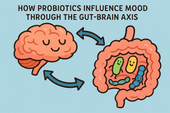
How Probiotics Influence Mood Through the Gut-Brain Axis
Discover how probiotics can do more than support your digestion—they can actually uplift your mood. This article explores the fascinating gut-brain axis and how balancing your gut bacteria through probiotics may help reduce anxiety, improve emotional stability, and support long-term mental well-being. 🌿🧠
-
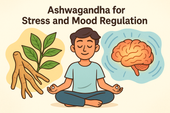
Ashwagandha for Stress and Mood Regulation
Discover how Ashwagandha, the powerful adaptogenic herb 🌿, helps your body manage stress and regulate mood. Learn how it balances cortisol, boosts GABA and serotonin, and supports emotional stability — helping you feel calm, focused, and resilient every day.
-
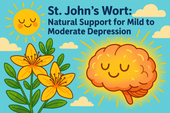
St. John’s Wort: Natural Support for Mild to Moderate Depression
Discover how St. John’s Wort, the “sunshine herb” 🌼, naturally supports mild to moderate depression. Learn how it boosts serotonin, balances mood, and promotes emotional resilience — with research showing its effectiveness compares to antidepressants, but with fewer side effects.
-
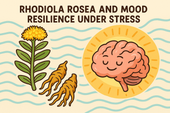
Rhodiola Rosea and Mood Resilience Under Stress
Discover how Rhodiola rosea helps your body adapt to stress 🌿. Learn how this powerful adaptogen balances cortisol, supports serotonin and dopamine, and strengthens emotional resilience — helping you stay calm, focused, and energized under pressure.
-

Chamomile and Lavender: Herbal Calm for Emotional Fluctuations
Discover how chamomile and lavender bring calm to emotional ups and downs 🌿. Learn how these two soothing herbs balance your nervous system, ease anxiety, and support restful sleep — naturally helping you find peace and emotional stability.
-
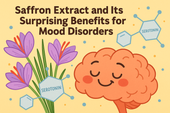
Saffron Extract and Its Surprising Benefits for Mood Disorders
Discover how saffron extract — the golden spice of joy 🌸 — can naturally support mood balance, ease anxiety, and lift mild depression. Learn what science says about its serotonin-boosting power, the ideal dosage, and how this ancient remedy compares to modern antidepressants.
-
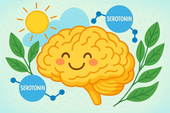
5-HTP and Serotonin: A Natural Path to Lifting Mood
Discover how 5-HTP naturally boosts serotonin 🌞 — the neurotransmitter behind mood, sleep, and emotional balance. Learn how this plant-derived compound supports happiness, reduces anxiety, and improves rest by helping your brain create more serotonin the gentle, natural way.
-
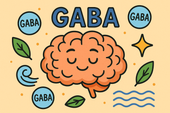
GABA Supplements for Reducing Anxiety and Mood Swings
Discover how GABA supplements can help reduce anxiety and balance mood naturally 🌿. Learn how this calming neurotransmitter works to quiet the mind, ease stress, and improve sleep — plus which nutrients and habits can boost your body’s own GABA production for long-term emotional stability.
-
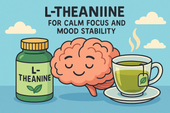
L-Theanine for Calm Focus and Mood Stability
Discover how L-theanine, the calming compound found in green tea 🍵, promotes focus, relaxation, and mood stability. Learn the science behind how it balances neurotransmitters, reduces stress hormones, and enhances clarity — helping you stay centered, calm, and productive without sedation.
-
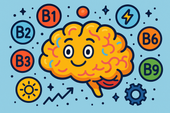
B Vitamins and Brain Chemistry: Supporting Energy and Emotional Balance
Discover how B vitamins power your brain chemistry ⚡. Learn how B6, B9, and B12 support serotonin, dopamine, and energy production — helping boost focus, mood, and emotional balance. From diet to supplements, explore how this vital nutrient group keeps your mind resilient and your energy steady.
-

N-Acetyl Cysteine (NAC) and Mood Disorders: What the Research Says
Learn how N-Acetyl Cysteine (NAC) supports brain health and mood balance 🧠. Discover how this antioxidant helps reduce oxidative stress, regulate glutamate, and improve emotional stability in depression, bipolar disorder, and anxiety — backed by cutting-edge psychiatric research.
-

Supplements for Bipolar Disorder: What May Support Stability
Discover the best supplements for bipolar disorder 🌿 that may support emotional stability and brain health. Learn how nutrients like omega-3s, magnesium, vitamin D, and NAC can help reduce inflammation, balance neurotransmitters, and complement traditional treatment safely.

















































